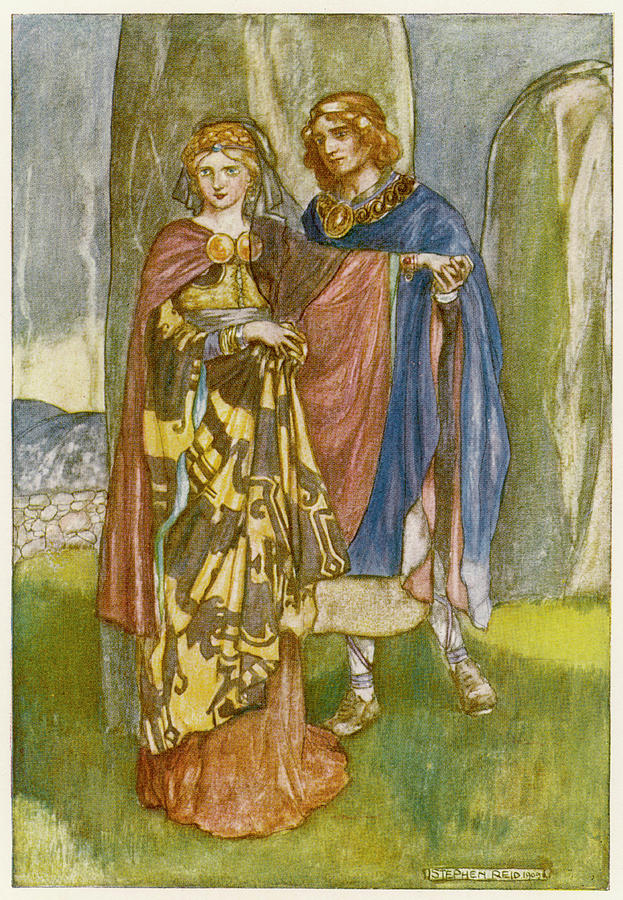Cuchulain talks with Emer by Stephen Reid 1910
"‘When I said: ‘Fair is this plain, the plain of the noble yoke,’ it was not the plain of Bray that I praised then, but the shape of the maiden. For I beheld the yoke of her two breasts through the opening of her smock, and it is of that I said 'plain of the noble yoke', of the breasts of the maiden.’
‘When she said: ‘No one comes to this plain, who does not kill as many as argat,’ viz. argat in the language of the poets means 'a hundred'; that is the interpretation, and this is what it means, that it is not easy to carry off the maiden, unless I slay a hundred men at each ford from Ailbine to the Boyne, together with Scennmenn the Wily, the sister of her father, who will change herself into every shape there, to destroy my chariot and to bring about my death,’ said Cuchulaind.
‘Geni grainde she said, i.e., she would not come with me, unless I jumped the hero's salmon-leap across the three ramparts to reach her. For three brothers of hers will be guarding her, viz., Ibur and Scibur and Catt; and a company of nine each of them, and I must deal a blow on each nine from which eight will die, but no stroke will reach any of her brothers among them; and I must carry her and her fostersister with their load of gold and silver out of the dun of Forgall.’
‘Bend Suain, son of Rosc Mele, which she said this is the same thing, viz., that I shall fight without harm to myself from Samuin, i.e., the end of summer. For two divisions were formerly on the year, viz., summer from Beltaine (the first of May), and winter from Samuin to Beltaine. Or sainfuin, viz., suain (sounds), for it is then that gentle voices sound, viz., sám-son 'gentle sound'. To Oimolc, i.e., the beginning of spring, viz., different (ime) is its wet (folc), viz the wet of spring, and the wet of winter. Or, oi-melc, viz., oi, in the language of poetry, is a name for sheep, whence oibá (sheep's death) is named, ut dicitur coinbá (dog's death), echbá (horse's death), duineba (men's death), as bath is a name for 'death'. Oi-melc, then, is the time in which the sheep come out and are milked, whence oisc (a ewe), i.e., oisc viz., barren sheep. To Beldine, i.e. Beltine, viz., a favouring fire. For the druids used to make two fires with great incantations, and to drive the cattle between them against the plagues, every year. Or to Beldin, viz., Bel the name of an idol. At that time the young of every neat were placed in the possession of Bel. Beldine, then Beltine. To Brón Trogaill, i.e. Lammas-day, viz., the beginning of autumn; for it is then the earth is afflicted, viz., the earth under fruit. Trogam is a name for 'earth.'’
Cuchulaind went driving on his way, and slept that night in Emain Macha. Then their daughters told the lords of land of the youth that had come in his splendid chariot, and of the conversation which he and Emer had held; that they did not know what they had said to one another, and that he had turned from them across the plain of Bray northward. Then the lords of land tell Forgall the Wily that, and that the girl had spoken to him. ‘It is true,’ said Forgall the Wily. ‘The madman from Emain Macha has been here to converse with Emer, and the girl has fallen in love with him, and that is why they talked to one another. But it shall avail them nothing. I shall hinder them from getting what they wish.’"
-The Wooing of Emer by Cú Chulainn
 |
| Cuchulain talks with Emer by Stephen Reid 1910. From Eleanor Hull’s “The Boys’ Cuchulainn.” (1910). |
Source:
https://pixels.com/featured/cuchulain-cu-chulainn-courts-emer-mary-evans-picture-library.html
Quote:


Comments
Post a Comment